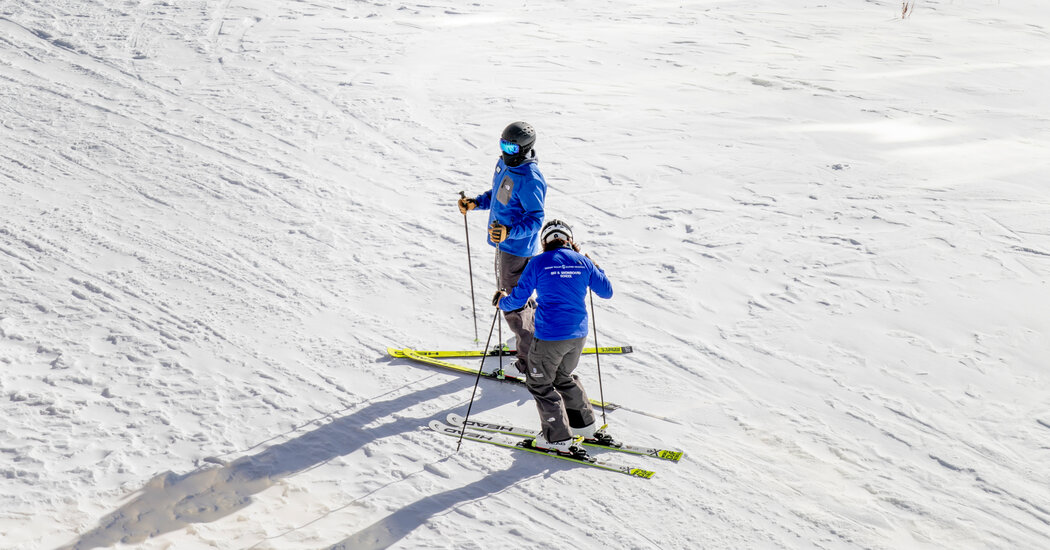Olympic Valley, California – A few skiers have recently meandered down the slopes at Squaw Valley Ski Resort. Couples and families tour the resort village, which is decked out with golden Christmas lights and caked in snow.
It seemed like the start of a fun season. But close examination revealed that it was nothing but a thing.
Restaurant patios were nearly empty as masked workers ravaged lime-green disinfectant sprays strapped to their backs, a fraction of the million dollars Squaw Valley spent on sterilization equipment and other safety measures. At the ski lifts, scattered groups waited in socially distant lines. Skier Sabrina Nottingham said the resort felt « very dead », in part because it was restricting ticket sales to less than 50 percent of normal.
Squaw Valley, a marquee destination for winter sports enthusiasts, is one of the many ski resorts across the country that are preparing for a very unpredictable season. Had to rethink how it worked Coronavirus pandemic As vaccines continue to roll out, resorts have brought about a slew of changes in places like Aspen, Colorado. Park City, Utah; Taos Ski Valley, New Mexico; And Killington, Vt. Many place visitor restrictions and require tickets; New Mexico has resorts limited to 25 percent of the capacity.
Resorts also reduce personal interactions by installing ticket booths, adding interpersonal space in line for ski lifts and gondolas, ordering masks, limiting the number of people on an elevator simultaneously, and, in some places, closing indoor dining.
While an epidemic It dealt a heavy blow to the entire travel industry, Ski resorts may feel a disproportionate impact this winter due to their short operating life. The ski industry already took a hit in the spring when the pandemic struck and many resorts were forced to close early, resulting in $ 2 billion in losses and causing layoffs or furloughs for thousands of employees, according to the National Ski Areas Association, a trade group. The industry has seen the fewest hits, 51 million, since the 2011-12 season, the association said.
Now, resorts like Squaw Valley are setting their expectations low for the new ski season.
« I don’t think anyone in this field is looking for this year to be the best ever, » said Ron Cohen, president of Squaw Valley and neighboring Alpine Meadows, which laid off 2,000 seasonal workers in the spring. « We want to keep our business so that when Covid is over, we have the opportunity to not be damaged so much that we may not be able to stand again. »
Mike Pearce, a spokesman for Mount Rose Ski Tahoe, a resort in western Nevada, said the mindset was « just maintain the status quo and survive ». He refused to provide any financial information, but said, « If a tie, it would almost be a success. »
Even before the pandemic, the ski industry was ramping up interest in the sport. The number of skiers has stagnated in the past decade, according to the National Ski Areas Association. Adrian Isaac, a spokeswoman for the trade group, said the resorts have tried to make snowboarding and snowboarding more accessible to newcomers, but have grappled with the perception that they mainly cater to the wealthy and whites. Climate change too It continues to affect snowfallShe said, which could lead to shorter seasons.
How the ski resorts operate this winter will have a domino effect on tax revenues for the nation’s economies. In New Mexico, the truncated ski season this past winter and this spring brought in $ 41 million in taxes, but George Brooks, executive director of the state’s Ski Association, said he expects no more than 40 per cent of that figure in the coming months.
Vail Resorts, the world’s largest ski company with 37 resorts around the world, including 34 in the United States, reported in a December 10 earnings call that it lost $ 153 million from August through October, larger than the $ 106.5 million loss in the same period. From last year. Rob Katz, chief executive of Vail Resorts, said season ticket sales were up about 20 percent, but he expected fewer visitors and fewer revenues this winter than in previous seasons.
At smaller spas, the pain may not be as severe. Diamond Peak Ski Resort in Incline Village, Nevada, said it knocked out nearly $ 1 million ahead of expectations after closing in the spring. Mike Pandelen, the resort general manager, said that smaller resorts often run at a loss in the final weeks of the season, so closing early really saves money.
Several resorts said they were still expecting some die-hard skiers and powder dogs this winter, along with locals and those who have moved into second homes nearby. At the Winter Park Resort west of Denver, A. The enthusiastic skiers crush This opening weekend this month caused congestion in the lift lines. The resort Quick action Gene Miller, spokeswoman said, to allow more divergence.
But the resorts and other ski experts have said that visitors who will not come are more likely to be casual skiers and those who travel over long distances.
« We’re going to lose mom and pop who want to raise their kids, » said Mr. Brooks.
In Colorado, Aspen Ski, which operates four ski areas, has had a steady business since it reopened on November 25, but will lose 20 percent of its annual visitors from other countries, spokesman Geoff Hanley said. He said Aspen might also see fewer travelers out of the state, especially if they live in places where they have to be isolated upon their return.
He said, « You have to be a very dedicated skater to say, ‘I’m going to go skiing, and I know that when I come home, I have to self-isolate. »
Even if the resorts make it through the winter, the small businesses that rely on skiers coming to town – such as restaurants, hotels, and retail stores – might not be so fortunate.
At Stratton Mountain Resort in Stratton, Watt, an Irish pub called Mulligan’s has laid off half of its staff. Because visitors to Vermont, which gets 80 percent of its ski traffic from other states, You have to quarantine For a week or two before they can go anywhere, Mulligan’s owner, Tom Rose, said he expects to lose up to 60 percent of his regular winter sales.
“We survived Hurricane Irene. Our sales took a real downturn after September 11. We have managed to get through the Great Recession,” said Mr. Rose, “But this pandemic is by far the worst.”
There are some bright spots. Backcountry skiSki tours – which often include climbing secluded snowy mountain ranges – are thriving. Equipment sales in neighboring countries jumped 76 percent from August through October compared to the same time last year, according to the NPD Group.
« Covid’s environment favoring socially distant outdoor leisure activities, along with restrictions in ski resorts, has accelerated interest in country skiing this season, » said Eric Henderson, a spokesperson for Snowsports Industries America, a trade group.
Those who have it He made the trips to the resorts and said they were glad they put in the effort. In Squaw Valley recently, Ms. Nottingham, 21, who was visiting other students from California State University, San Luis Obispo, said that although the resort was quiet, the experience “felt safer than going to the grocery store because everyone was covered” In any case « .
Squaw Valley, Which opened in 1949 and hosted the 1960 Winter Olympics, has undergone major changes in recent years. In 2010, it was bought by a private equity group called KSL Capital Partners, and merged with neighboring Alpine Meadows the following year. Together, the two resorts span over 6,000 acres, more than any resort in the Lake Tahoe region, and have 42 elevators and over 270 trails.
In August, Squaw Valley said That would change his name By 2021, because the term « Squaw » is considered racist and sexist for Native American women.
But nothing the resort has gone through matches the chaos of the epidemic, Cohen said. While declining to disclose the financial data of Squaw and Alpine, he described losses in the spring as « devastating » and said the resorts were « operating at low profit margins » this winter, with weak sales.
The disorder became doubly apparent this month when A. New order to stay at home It came into effect in the region, forcing resorts to cancel hotel stays and adding another wrinkle to potential visitors.
For ski resorts, the slogan now is « Survive and Survive, » Mr. Cohen said.





